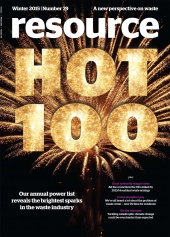Making waste pay
It must be more than 10 years now since I first saw the phrase ‘waste is a resource’. It has been a unique resource, the only resource I know that we spend billions of pounds on to get rid of.

In the last six years in particular, the value of our recycled materials has periodically experienced exponential growth, but, by and large, local authorities have not been awash with cash from these materials. This year, waste operators are pointing to some slowdown in recylate markets, but the long-term picture for recyclate prices still looks bright. In the longer term, the cost of producing new materials coupled with growing economies in a globalised world means life is going to continue to grow very much more resource intensive. This can only lead to strong values for recyclates, particularly high-quality recyclate.
But what are local authorities doing to extract that value? Some are clearly on the front foot, the Hertfordshire Waste Partnership being a good example, selling recyclable materials directly to markets (even via e-auctions). The South London Waste Partnership has set up a framework (open to other London boroughs) to do short-term 12-month trades on recyclate materials. These are the kinds of market-savvy approaches that local authorities need to tap into.
Having advised local authorities across Britain, I have seen there are various reasons that they are unwilling or unable to maximise their opportunities when it comes to recyclate value. Selling materials is best done with volume, and volume is best achieved in partnership, and partnership carries political complexity. These complexities are not insurmountable, and the barriers to joint working tend to be flimsy under closer scrutiny, but unless officers can provide a strong steer as to the benefits of working in partnership and the mitigations of members’ concerns, such partnerships can be difficult to get off the ground.
Fundamentally, for a local authority to operate well in a recycling market, it must have the procurement route to market, the contractual flexibility and wherewithal and negotiation skill to trade effectively. It also must ally all of this to a knowledge about market prices.
 This article was taken from Issue 79
This article was taken from Issue 79These conditions require a set of legal and particularly commercial skills that understandably waste service managers are unlikely to have. Authorities tend to be locked into long-term contracts that leave the selling of recyclates purely as an issue for the contractor, without recourse for the client to know about how they perform in these markets or to share income. Most commonly, authorities see recyclate marketing as a risk that has been passed on. In truth, more often than not, it is an opportunity that has been lost.
So with all of the challenges, are things likely to change? Pleasingly, the answer would appear to be yes. The parlous state of public finances is encouraging the public sector to be more commercially driven, and this means there is renewed focus on how we collect, sell and distribute revenue from recyclates.
Underpinning all of this is the issue of transparency and performance metrics. Contractors will increasingly be expected to share revenue in a transparent way and be held accountable for the prices they can achieve. This is the future of waste as a resource. The most forward-thinking authorities are having full strategic and commercial reviews of their contracting structures and opportunities. This is already giving rise to substantial financial benefits at a time when the public sector most desperately needs to realise that waste is not just a resource that we must pay to offload or accept a few crumbs to get rid of.
Frank Smith is Managing Director of Malpka Consulting frankfs@malpka-consulting.co.uk






